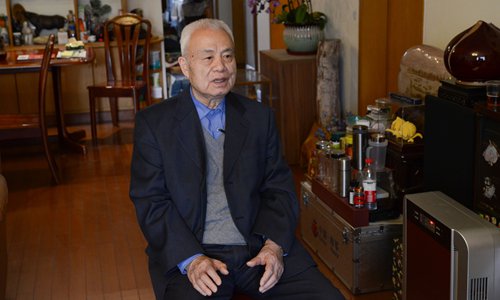China’s ‘Underground Steel Great Wall’ capable of defeating hypersonic weapon attacks: academician
China should stay alert to US low-yield nuclear warheads

Qian Qihu, recipient of the 2018 State Preeminent Science and Technology Award, during his interview with the Global Times on Friday. Photo: Deng Xiaoci/GT
China's "Underground Steel Great Wall" could "guarantee the security of the country's strategic arsenal" against potential attacks, including those from future hypersonic weapons, Qian Qihu, recipient of the country's highest science and technology award, told the Global Times.
Qian, 82, an academician of both the Chinese Academy of Sciences and the Chinese Academy of Engineering, received the 2018 State Preeminent Science and Technology Award during a conference at the Great Hall of the People in Beijing on Tuesday.
The "Underground Steel Great Wall" is a series of defense facilities located deep under mountains. While the mountain rock is thick enough to resist enemy attacks, entrances and exits of these facilities are often vulnerable and Qian's work was to provide extra protection for these parts.
China's nuclear strategy follows the principle of "no first use" and requires the country to have the capability of withstanding a nuclear attack before it responds with its strategic weapons.
Qian's work guaranteed the safety of the country's strategic weapons, launch and storage facilities as well as commanders' safety during extreme times, said Song Zhongping, a military expert and TV commentator.
In an exclusive interview with the Global Times on Friday, Qian describes his work, the "Underground Steel Great Wall," as the "country's last national defense line."
If other lines of defense including the strategic missile interception system, anti-missile system and air defense system fail to function against hypersonic missiles and recently developed bunker-busters, Qian's work can still thwart such attacks.
"The development of the shield must closely follow the development of spears. Our defense engineering has evolved in a timely manner as attack weapons pose new challenges," Qian said.
According to the academician, hypersonic weapons that move 10 times as fast as the speed of sound are capable of changing trajectory mid-flight and penetrate any anti-missile installations.
US media outlet CNBC reported that in March 2018 during a State of the Nation address, Russian President Vladimir Putin debuted new nuclear and hypersonic weapons, which he described as "invincible."
The US is also trying to develop hypersonic weapons, as then US Deputy Secretary of Defense Patrick Shanahan, now acting secretary of defense, said in October. "We are going to fly sooner and more often than people have ever expected," CNBC reported.
Emerging challenges
National defense challenges do not only emerge from the development of advanced attack weapons but are also a result of an unpredictable international environment, Qian said.
He cited the recent US stance whereby the Donald Trump administration is mulling lowering the threshold for nuclear weapons deployment.
The US is planning to loosen US nuclear weapons constraints and developing low-yield nuclear warheads, the Wall Street Journal reported in January 2018.
It is highly possible that US weapons with low-yield nuclear warheads are bunker-busters, with a higher surgical strike capability that may cause larger damage, military experts previously noted, warning that China should stay alert and upgrade its own national defense.
Qian has also provided advice on civilian construction projects, including the Nanjing Yangtze River Tunnel, the Hong Kong-Zhuhai-Macao Bridge and the giant South-to-North Water Transfer Project, according to a China Global Television Network report.
Asked how he would spend the 8 million yuan cash award, Qian said that part would go to research on national defense, and the rest used for social welfare projects such as fighting poverty and supporting poor students.
"I have never had a thought of earning any prize money for my research, nor would I think it came too late," Qian said. "I am only grateful that national recognition offers a great opportunity to raise the public's national defense awareness."


